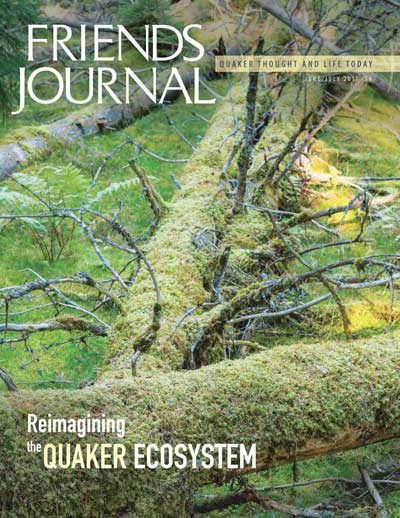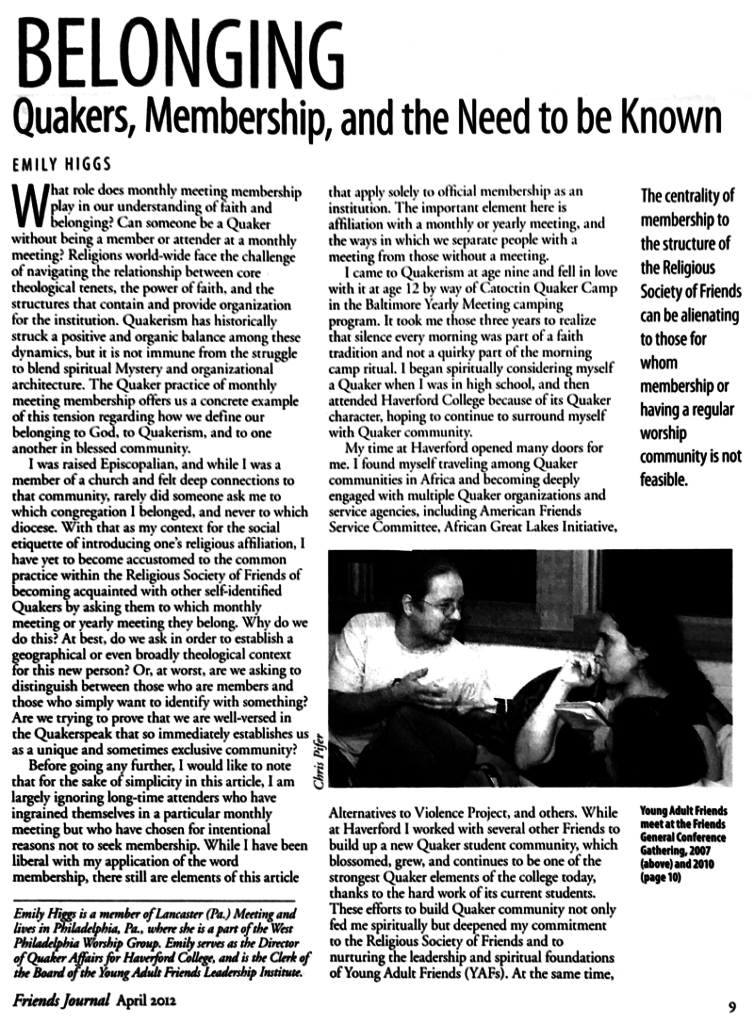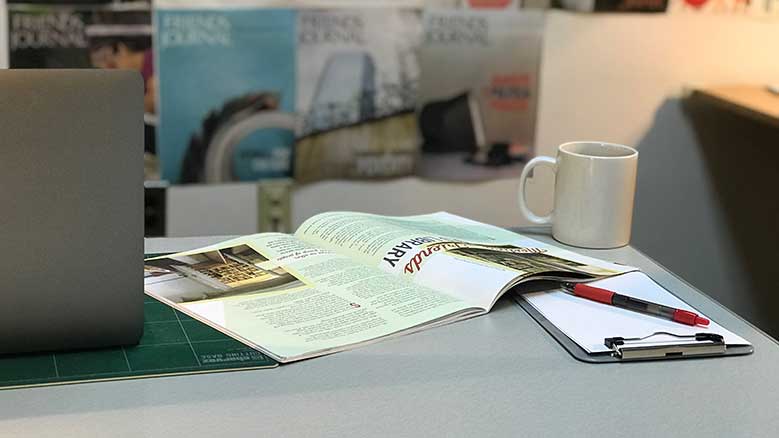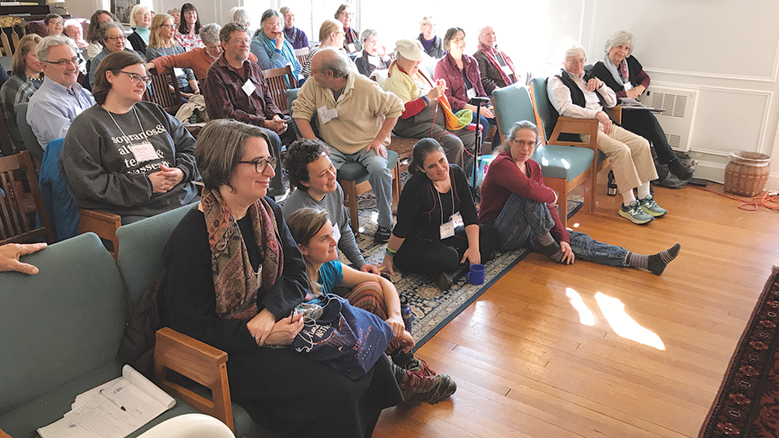
The Alternate Pathways to Membership Working Group was formed semi-spontaneously in New York Yearly Meeting, and was formally taken under the care of the Ministry Coordinating Committee in November 2016. We have seven active members.
Our work is to discern whether we may be led to recommend one or more alternate pathways to membership within the Religious Society of Friends—and if so, what those recommendations might be. As we’ve explored the membership process, it’s become obvious that the question, “How do we approve and accept new members?” is inseparable from other questions, such as, “What does membership mean?,” “What is a monthly meeting for?,” and “How do Friends care for one another?”
We’ve discovered a need to begin with stories—the personal stories of Friends, plus the historical stories surrounding our current membership practices. In deep listening to all of these pieces, we begin to understand our collective story and how Spirit might guide us next.
Here we present two of our own stories. What common themes do you hear? Where do the stories diverge? What questions rise up in you?
Emily’s story
My yearly meeting has gathered in the same place every summer for the past 60 years. In 2014, I discovered that if I slipped into the auditorium after breakfast, but before worship sharing, I could have the space to myself for ten whole minutes. I used this time to stand on the stage and look out over the empty wooden seats. I’d imagine all the generations of Friends who came before me, and I’d envision all the generations of Friends still to come. It felt like holding hands across time. It felt like communing with family.
I was not born a Friend, but I knew as a child that my parents’ faith wasn’t mine. I started seeking at age ten and found Quakers at 27. When I finally found Friends, the sensation was one of finding home.
That’s why I applied for membership so quickly. It took ten months, and only that long because I couldn’t figure out who to ask. I wanted to claim my people and to be counted among them.
I always thought of membership as joining the worldwide body of Friends. I had a nice local meeting, and I loved the people there, but this was more, a big thing we were doing around the world all together. After I’d been a Friend awhile, somebody gave me historical language to describe that thing. We were a covenant community, given to one another by God, charged with establishing the kingdom of God on earth. And that moment that I remembered so vividly—October 10, 2010, when the clerk had asked, “Do we accept Emily into membership?” and the body had chorused, “APPROVED!”—that was the moment I had joined the covenant, and the moment the meeting had reaffirmed it.
Or had they?
Shortly after becoming a member, I threw myself into travel and study. I attended conferences, asked questions, worshiped with Friends from far away, and read everything I could find. I began to know more about traditional Quaker understandings. More importantly, I began to experience all that came from the practice of traditional Quakerism.
For example, I began to learn what it meant to “establish the kingdom of God on earth.” I learned that it wasn’t just about protesting wars and advocating for climate justice, though of course Friends’ witness in the world was imperative. It was also about practicing long-term mutual commitments, about learning the sorts of skills required to coexist in a meeting with the most annoying person you’ve ever met—not just to coexist, but to voluntarily enter into a process, again and again, in which you and that person mutually seek to discern the will of God. Only by practicing these skills among ourselves can we ever hope to help bring them to the world.
Still later, I learned about spiritual accountability. “Have you established a daily spiritual practice?” elders asked me. “Are you being faithful to Spirit’s call?” When I found myself doing more work among Friends, some of those same elders said, “Have you asked your meeting for a support committee?” and “Do you carry a travel minute?” They explained that ministry must be rooted in your meeting, and that this is why we have local meetings—for mutual support and accountability.
When I first became a Friend, I’d assumed that we had monthly meetings because we needed geographically convenient groups to worship with. But now I understood that my membership within my local meeting was an important part of the covenant, equal to marriage in solemnity and level of commitment. I was responsible for the other members of my meeting, responsible for helping them to be faithful—and they were equally responsible for me.
And this is why I can have the traditional-membership-versus-alternate-membership argument all by myself, internally. Because nobody in my meeting ever told me these things—not about the covenant, not about practicing the establishment of the kingdom of God, and certainly not about mutual spiritual accountability. They didn’t tell me because most of them didn’t know. They themselves had never been taught these things. So how is it possible, when they accepted me as a member of the meeting, that they were reaffirming the covenant, if neither they nor I knew that was what we were doing?
What I know now, experientially, is that membership in a meeting exists because God gives us to a specific community of people so that we might worship with one another, commit to one another, care for one another, and know one another in that which is eternal so that we can have the conversations about personal faithfulness and accountability—the kinds of conversations that we simply don’t have with occasional acquaintances. And I cannot imagine how Quakers who are not fully committed—covenanted—to a local community could have this vital, long-term, mutual relationship.
Yet here’s the question I find myself asking: when many, perhaps most, local meetings are not fully engaging in the meaning and practice of membership and covenant community, when many or most Friends don’t even know about these traditional concepts, or else reject them, and when Friends I love are telling me that traditional membership is either not possible or not relevant in their circumstances, then is God really asking me to hold to traditional membership?
I do not know the answer yet.
Jennifer’s story
I have always identified Quaker. I have not, however, felt true connection with a monthly meeting. As a twelfth-generation Friend born into a family that moved frequently, I was never in a meeting long enough to gain a true sense of connection. My spiritual home became New England Yearly Meeting. I attended every year, became deeply involved in junior young Friends and young Friends, and by high school never missed a monthly retreat. I also attended Friends Camp in Maine during summers. The community gained within those circles is incredibly transformative and will last my lifetime.
Some of my family had, at one time, strong connections with monthly meetings. Over the generations they even helped establish some. By the last three generations, my family lived internationally, and membership in a monthly meeting meant accommodating to what was available in places that often had very few monthly meetings, far apart. My mother attended seven monthly meetings before she married. I attended four by the time I was nine.
After finishing my undergraduate work I began a career that placed me in an office most Sunday mornings. My family did not express concern over this, as they had faced challenges of their own regarding attendance. I kept my faith strong in other ways through volunteer work, mediations, assisting others in exploring connection to source, and activism. I witnessed and was witnessed to in the ways my life could accommodate.
Throughout these times I retained membership at a monthly meeting—one I had not attended in many years. I did so not because of a connection to the meeting itself, but because I could not imagine the loss of card-carrying Quaker membership. I struggled with that choice and the discord within. Attending a Quaker function often meant this monthly meeting boldly displayed on my nametag. In conversation, the introductory question was often which meeting I attended.
It was a difficult position to be in. I felt my connection points lay elsewhere, and this label did not adequately express my relation to, nor my understanding of, being a Quaker in the world. After reconnecting with more childhood young Friends at a retreat in 2015, I realized my circumstances were not unique. Many of us felt a tug-of-war surrounding our identification with membership. We understood that today’s society is often one of frequent travel and relocation. We often live far from the places to which we identify, and we yearn for a way to feel properly represented as the Quakers we are.
Joining the Alternative Pathways to Membership Working Group was something I was deeply led to do, and I am grateful for the opportunity. Through this work I am reminded that Quakerism means we adjust and change as times and perspectives become clearer. Hearing a wide variety of experiences has been grounding. I can more clearly understand not only the reasons for my situation, but also how connection to a monthly meeting can provide many people with a spiritually grounding, uplifting, and supportive base.
This new lens gave me appreciation for the space provided within monthly meetings, and I began the process to move my membership to the meeting I attend when able—Fifteenth Street Meeting in Manhattan. Yet I am still operating within the one path available to me. I wish for others.
There are great struggles associated with having just one seated connection. I know my core identity within Quakerism is not the loving spot in which I corporeally worship when I am able. I see Quakerism’s boundaries, and they worry me. Many in my generation have moved on from membership due to the struggle of being mislabeled and misunderstood. I want those voices heard.
Ask yourself; does anything within this resonate for you? Could a loved one be experiencing this? Perhaps an oft-missing member of your meeting? Think about other Quaker entities you connect with. What sense of relation do you feel to them? Could you imagine other gateways to Quakerism? What would happen if you lived too far away from a monthly meeting? What if you’d stepped into a few local meetings but none felt right? What if you attended many a Quaker conference, session, and workshop but never felt a leading to connect with a meeting. What if you were too overloaded with work and child-rearing to attend a meeting with any regularity? How else might you connect to source and communion with others?
As Friends we seek. As seekers we have a duty to give all those who seek a connection that sits right within them. We must find these ways.
The Alternative Pathways to Membership Working Group needs your story. What has membership meant, or not meant, in your journey as a Friend? nyymaltpathways@gmail.com






Religious people who are not in community are not fully experiencing their religious tradition. Who left Egypt with Moses? those who were part of the community. The ones who did not leave were no longer part of the people of Israel, and neither were their children.